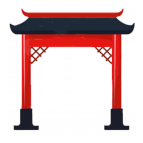Memory phrase for the character: 威
威
Meaning
authority, power, prestige Pronunciation wēi Explanation Outside: garrison 戍 (persons 人 (= ノ+ 一) with halberds 戈), woman 女
Mnemonic
Show English
When the person with that halberd stands with one leg 一 above a woman, he has a powerful authority. Radicals
戎
military The ten 十 (persons) at the halberd 戈 form the military.
女
woman The character for tall 大 shows a person 人 with outstretched arms 一. If you shift the lower strokes towards each other, you can get the: woman 女. The wider lower area can be understood as female hips?
戈
halberd
Tip: Go to the radicals that are contained in this character and learn all the characters with this radical systematically!
Vocabulary
1599 7588 7586 5798 5495 4956 4750 4134 3301 2822 2292
威信 wēi xìn
prestige; reputation; trust; credit with the people
核威慑政策
hé wēi shè zhèng cè
policy of nuclear intimidation
威慑 wēi shè
to cower by military force; deterrence
挪威 Nuó wēi
Norway
鲍威尔 Bào wēi ěr
Powell (name)
威廉 Wēi lián
William or Wilhelm (name)
威尔逊 Wēi ěr xùn
Wilson (name)
艾森豪威尔
Ài sēn háo wēi ěr
Dwight D. Eisenhower (1890-1969), US army general and politician, Supreme Allied Commander in Europe during World War II, US President 1953-1961
威胁 wēi xié
to threaten; to menace
示威 shì wēi
to demonstrate (as a protest); a demonstration; a military show of force
权威 quán wēi
authority; authoritative; power and prestige
权威 quán wēi
Japanese kanji, please follow this link .
List of the characters | List of the radicals
